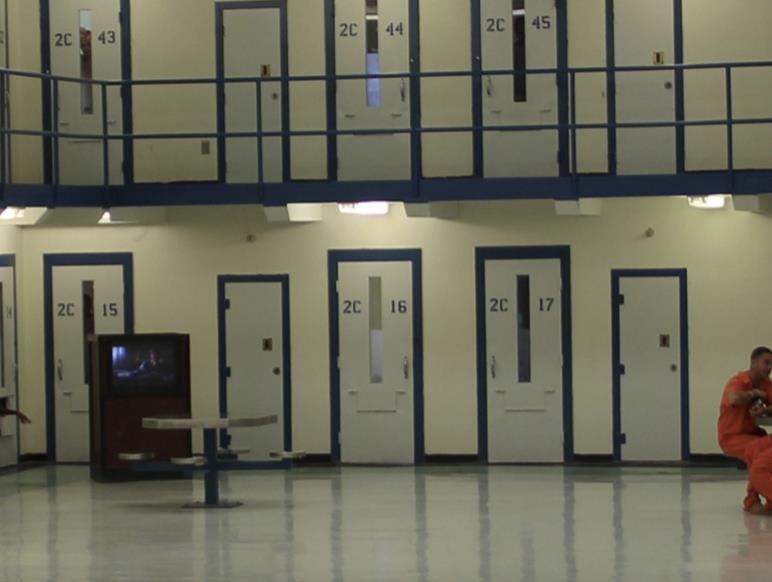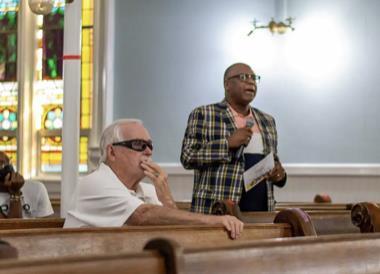
Section Branding
Header Content
Chatham sheriff resumes jailing for misdemeanor crimes in return to pre-COVID policy
Primary Content

Jake Shore, The Current
Chatham County’s sheriff is now accepting people charged with misdemeanors into the jail, reversing a COVID-era policy that turned low-level offenders away instead of jailing them.
Chatham County Sheriff John Wilcher made the decision last week, according to his top deputy. It comes amid a politically fraught debate over crime in Savannah and its nearby communities.
Eastern Judicial Circuit District Attorney Shalena Cook Jones, a so-called “progressive prosecutor,” had praised Wilcher’s ban on misdemeanor jail bookings, arguing it reduced unnecessary incarceration. But on Friday, Wilcher hosted Gov. Brian Kemp in his office to sign a bill into law creating a commission to oversee and discipline state prosecutors. It’s a law that some local Republican legislators have pushed for in order to punish Chatham DA Jones for allegedly being too soft on crime.
There was no specific impetus to the misdemeanor decision, according to Chief Deputy Gary Taylor.
“The sheriff has been in this business for 40 some years,” Taylor said. “The sheriff knows the importance of police officers having the ability to utilize the laws to properly protect for public safety.”
Sheriff Wilcher declined to speak with The Current when reached Tuesday. According to Taylor, Wilcher coordinated with the heads of local law enforcement to let them know about the change.
The Savannah Police Department declined to comment on whether this was a decision it sought. The Pooler Police Department said only that Chief Ashley Brown was informed last week of the change.

A spokesperson for the Chatham County Police Department said Chief Jeff Hadley and Sheriff Wilcher speak weekly and this has been a topic of repeated discussion.
“Prior to Sheriff Wilcher making his most recent decision to start accepting all misdemeanors, he had been amenable to law enforcement when unique circumstances existed and we have requested a misdemeanant be booked into the jail,” spokesperson Betsy Nolen wrote in an email.
How did it work before?
At the beginning of COVID-19 pandemic, the Chatham County Detention Center announced it would stop accepting people accused of low-level misdemeanors in order to not crowd the jail. Jails and prisons were hotspots for COVID infections because of the enclosed spaces and close contact.
Misdemeanors are considered less severe crimes, like trespassing, shoplifting and marijuana possession. Punishments are capped at a year in prison and/or $1,000 in fines. Misdemeanors make up the vast majority of crimes in Chatham County’s legal system.
Sheriffs run jails, which hold people awaiting trial who were either denied release or can’t afford to pay their bail.
The jail’s policy during the pandemic turned away all misdemeanors, except for driving under the influence, domestic violence or “anything of aggravated nature that might pose a threat back out there in the community,” Taylor said.
Most misdemeanor crimes receive a bond, which is the agreement for a person to be released from jail and promise to return for court. Most of the common misdemeanors receive one from Chatham County’s bond schedule. The schedule sets dollar amounts for bail to post in order to secure release. The schedule also makes it unnecessary to hold a hearing in front of a judge for every crime.
Two or more of the same misdemeanor crimes warrant jail and a bond hearing in front of a judge who would decide release terms, according to Savannah criminal defense lawyer Doug Andrews.
Wilcher’s COVID policy had upended this process. The sheriff gave people accused of non-serious misdemeanors “own recognizance” or O.R. bonds to supersede the automatic, schedule bonds in most cases, according to Assistant Chatham County Attorney Andre Pretorius.
The policy was put in place on March 11, 2020, and stayed in place for more than 3 years.

Progressive DA targeted
The misdemeanor policy created unlikely common ground between the sheriff and the DA.
Sheriff Wilcher, a 78-year-old white Republican man who spent four decades at the Sheriff’s Office, and DA Jones, a 45-year-old Black woman who ran as a Democrat and reform prosecutor, found an uneasy alliance after COVID.
During a September 2022 speech for Savannah’s NAACP, Jones shouted out the sheriff, who was in attendance, for his misdemeanor policy.
“We need to be resolving criminal justice cases, particularly the serious ones, as early as possible at the front gate, not the back door,” Jones said. “I want you to know the sheriff has made this clear.”
But that common ground has since crumbled, as Jones has increasingly been a target for some local and state lawmakers who accuse her of abandoning her primary responsibility to prosecute crimes, in favor of pleading down violent crimes and seeking lenient bonds for people accused of crimes.
Nowhere was that love lost more evident when Sheriff Wilcher allowed his office to serve as the backdrop for Gov. Kemp to sign into law the creation of the Prosecuting Attorneys Oversight Commission on Friday. That the bill was signed in Chatham County served as a signal of where the commission may be looking.
Its members will have the power to “discipline, remove or cause involuntary retirement” of DAs who commit “willful misconduct” or fail to carry out their duties, the law states. The eight members are appointed by the Republican governor, lieutenant governor, senators and house speaker.

State Rep. Jesse Petrea (R-Savannah) has advocated locally for the law and been highly critical of Jones. After the bill signing, he pointedly told a TV station he had a message for DA Jones: “Your job is to protect this community by holding criminals accountable for their crimes. Please, just do your job.”
Root causes
The return to booking all misdemeanor crimes into the jail furthers the divide between the chief jailer and prosecutor in the county.
A spokesperson for Jones did not respond in time for publication of this story. The decision is a blow to local criminal legal system reformers.
Taylor, with the sheriff’s office, said staffing did not play a role in the decision. He said the jail is down by 90 corrections officers. The vacancies are lower than it was at the start of the year, he said, and there has been an increase in applications.
Coco Papy, public policy director at nonprofit Deep Center, said jails are the largest mental health providers in the state. She said people charged with misdemeanors in Chatham County end up in jail because root causes like poverty, mental health and addiction haven’t been addressed.
“Our community doesn’t want high recidivism. Those impacted don’t want that. I truly don’t think the people who work in our jail or our courts or law enforcement want that. We can make outcomes better here,” Papy said. “But we can’t jail our way out of this.”
This story comes to GPB through a reporting partnership with The Current.

